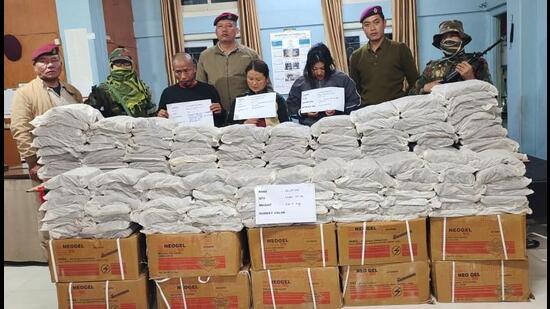Mizoram emerges as transit hub for explosives smuggling
In 2024, there were 13 such seizures, aggregating over 2000 kg of explosives, at least 60,000 detonators, and 13,000 gelatine sticks.
On the afternoon of March 1, Assam Rifles personnel posted in Mizoram’s Siaha district, sandwiched between the Indo-Bangladesh and Indo-Myanmar border, apprehended a man with 46 packets of explosives, a military camouflage outfit, and ammunition. This marked the ninth time this year that the force intercepted explosives being smuggled from the northeastern state to anti-junta forces in Myanmar or insurgent groups in Bangladesh.

In 2024, there were 13 such seizures, aggregating over 2000 kg of explosives, at least 60,000 detonators, and 13,000 gelatine sticks, according to data reviewed by Hindustan Times.
But in the first two months of this year, there have been nine seizures , involving 1150kg explosives, 15,270 detonators, and 6,030 gelatine sticks.
The source of the explosives is usually licensed dealers who sell them for use in mining and quarrying; but there is significant misappropriation, and then smuggling.
Senior Assam Rifles officers said the force’s Mizoram unit has written to the state government multiple times in the past six months about such explosives being misappropriated and sold to pro-rebel forces in Myanmar fighting the country’s military junta. In the latest case, Assam Rifles personnel suspect the consignment was destined for Bangladesh. Mizoram shares a border with Bangladesh and Myanmar, and both countries are in strife.
“The most recent letter was sent last month about our growing concern related to explosives being misused and sold to insurgent groups across the country’s border. There is a need to monitor the sale of explosives by the state’s licensed dealers. These explosives are commonly used in mining, quarry, and construction work,” said one officer who asked not to be named.
He pointed to a larger danger -- of these explosives being routed back to Indian militant and terrorist groups.
“If such explosives are being misused and sold in bulk to insurgent groups across the border, it is only a matter of time before the insurgent groups send these explosives within India too.”
The data reviewed shows that the explosives are made by registered manufacturers in Maharashtra, Hyderabad, and Rajasthan, although a second official who asked not to be named added that the companies are not at fault because they are licensed and supply it to government-approved explosive dealers. The most commonly seized explosive Neogel 90 has been used in blasts by terror groups such as Indian Mujahideen in 2007 Hyderabad and 2008 Jaipur blasts. In 2020, the same explosive was seized from a suspected militant hideout in Kashmir’s Karewa area.
The second official added that in 2022, the National Investigation Agency(NIA) unearthed the first case of Mizoram being used as a transit point for smuggling explosives to Myanmar. Since February 2021, Myanmar’s pro-rebel forces have been fighting the military junta.
“ NIA in its charge sheet in July 2022 informed the court about their finding of local groups helping the pro-rebel groups in Myanmar by supplying these explosives from here. Since then, the cases have only increased. The district administration should sternly check how the licensed contractors are helping misappropriate the explosives,” the second official said, reiterating he need to speed up the fencing along the Indo-Myanmar border.
The Centre has approve the construction of a border fence along the 1643 km long Indo-Myanmar border that passes through four states -- Mizoram, Manipiur, Arunachal Pradesh and Nagaland. On Saturday, Union home minister Amit Shah, while chairing a meeting on the situation in Manipur, which has been wracked by ethnic conflict since ay 3, 2023, directed Manipur administration and security forces to fence the entry points along the state at the earliest.
All Access.
One Subscription.
Get 360° coverage—from daily headlines
to 100 year archives.



HT App & Website







